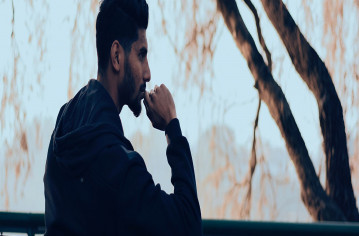Contemplate/
Fundamentals
-
Category
6 Articles of Faith 5 Pillars of Islam
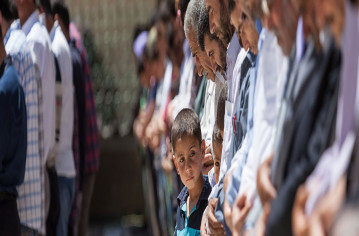
5 Pillars of Islam: The Overview
Islam has its basic religious practices. They are the actions of the limbs manifesting the Iman (belief) that one has. These practices are a form of submission of oneself, a form of worship to Allah in a way that He accepts as how He prescribed. They are unique as they have precise expressions, precise procedures, and proper performances which cannot be performed in disorganized ways. One cannot argue the beauty of these practices which Allah has ordained as they are attuned to the nature of man, giving benefits to the soul and physical entity of man, even as an individual and as a community. We have to learn from Prophet Muhammad Peace Be Upon Him (PBUH) as we cannot perform any forms of worship according to our desires.
Prophet Muhammad (PBUH) said: “Islam is based on (the following) five (principles): To testify that none has the right to be worshipped but Allah and Muhammad is Allah's Messenger, to offer the (compulsory congregational) prayers dutifully and perfectly, to pay obligatory charity/Zakat, to perform Pilgrimage to Mecca/ Hajj, and to observe the fast during the month of Ramadan.”
1. The Testimony of Faith/ Shahadatain
The first pillar of Islam is the testimony of faith/ shahadatain (link to article shahadah). A Muslim testifies to his belief, pronouncing the simple statement in full consciousness and sincerity.
شْهَدُ أَنْ لَا إِلَهَ إِلَّا اللهُ وَأَشْهَدُ أَنَّ مُحَمَّدًا رَسُولُ اللهِ
"I bear witness that there is no God but Allah, and I bear witness that Muhammad is the messenger of Allah".
Ash-hadu an laa ilaaha illallah, wa ash-hadu anna muhammadan rasuulullah.
This testimony consists of two components, first, negating and affirming that Allah alone is worthy to be worshipped, and second, accepting that Prophet Muhammad (PBUH) is the messenger of Allah who is tasked to spread Allah’s message to mankind.
To embrace Islam, one has to declare this statement clearly, sincerely, and in full consciousness, in the presence of witnesses. Upon testifying his belief, he is bestowed all the due rights of a Muslim and is entrusted with all responsibilities of being a Muslim. This statement is not just a mere utterance of the tongue, but it is a vow for complete submission and commitment to Allah’s religion. He has proclaimed himself as a Muslim and therefore, the the testimony of faith/ shahadatain is the essence of the Islamic creed and the identity of the religion.
2. Establishing compulsory prayers/Salah
Prayer/Salah is the second pillar of Islam. It professes one’s belief in the physical actions of a body together with the presence of the heart. It is important to perform the compulsory Prayer/ Salah in its proper requirements and conditions (link to article 5 prayers) as brought by Prophet Muhammad (PBUH).
The command to establish Salah is not new, but it was made obligatory to all prophets and all people even before the appointment of Prophet Muhammad (PBUH). For example, when Prophet Musa (PBUH) was receiving the Scripture at Mount Sinai, Allah spoke to him. “And I have chosen you, so listen to what is revealed [to you]. Indeed, I am Allah. There is no deity except Me, so worship Me and establish prayer for My remembrance.”
Likewise, for Muslims, Salah is prescribed to Prophet Muhammad (PBUH) five times a day, on the night of the Night of Ascension /Isra’ and Mi’raj, to be made as an obligatory act of worship for all Muslims.
Salah is significant to the life of a Muslim as it will be the first act of worship to be accounted for in the Day of Judgement. As the Prophet Muhammad (PBUH) said: “The first action for which a servant of Allah will be held accountable on the Day of Resurrection will be his prayers/salah. If they are in order, he will have prospered and succeeded. If they are lacking, he will have failed and lost. If there is something defective in his obligatory prayers/salah, then the Almighty Lord will say: See if My servant has any voluntary prayers that can complete what is insufficient in his obligatory prayers. The rest of his deeds will be judged the same way.”
Aside from gaining rewards in the Hereafter for performing obligatory prayers/Salah, a Muslim will develop a sense of discipline and self-consciousness, knowing that there are specific times to perform his Salah. By doing so, he can attain a peaceful mind, healthy body, and harmonious life. These experiences can be enhanced when one performs Salah in congregation, hence, being able to socialise with others and reciprocating the love between congregants. However, knowing to perform this action is necessary, as Allah accepts Salah according to the teachings of Prophet Muhammad (PBUH), as he said: “Pray as you have seen me praying.”
3. Paying obligatory charity/Zakat
Obligatory Charity/ Zakat is the third pillar of Islam. It is an annual contribution of wealth with a minimum amount to be given to specific groups of recipients that Allah has commanded. Performing this act will purify oneself from stinginess and miserliness, inculcating the sense of social consciousness, and being responsible for the needs of society. This will also be a reminder for him to be grateful for Allah's blessings. Apart from purifying oneself, it is also purifying the wealth from having the possibility of accumulating it out of justice (link to article zakat). Prophet Muhammad (PBUH) said, "Whoever pays the obligatory charity/zakat on his wealth will have its evil removed from him."
This obligatory charity act is not to be confused with a general charity or donations known as Sadaqah. Obligatory Charity/ Zakat has its conditions and requirements as prescribed by Allah, starting from a precise amount to be given to the specific group of recipients which are stated in the Quran. General charity/Sadaqah, on the other hand, is to give contributions without a specific amount, specific recipients, and a restricted period. This shows that Obligatory Charity/Zakat, as it is obligatory upon all Muslims, is the first act to nurture being selfless and being content with what they have.
4. Fasting – Sawm
The fourth pillar of Islam is Fasting/Sawm, fasting in the month of Ramadhan. It is to abstain oneself from eating, drinking, and having sexual activity with their spouse from dawn to dusk. This act of worship is a strong way to develop self-restraint and to enhance spirituality and be closer to Allah.
The significance of fasting (link to article fasting) is not only beneficial for health but also for receiving special rewards from Allah. As Prophet Muhammad (PBUH)said: "There is no good deed that the son of Adam does, but between ten and seven hundred good deeds/Hasanahs will be recorded for him. Allah, the mighty and sublime, said: 'Except fasting, for it is for me and I shall reward for it. He gives up his desires and his food for my sake.’”
5. Performing Pilgrimage to Mecca/Hajj
The last pillar of Islam is to perform, a pilgrimage to Mecca/Hajj, once in a lifetime when one has the means to perform it. This journey is special (link to article on hajj) as it is being performed in a sacred month and place, with specific actions that incorporate Prayer/Salah, Circumambulation/ Tawaf, walk from the mount of Safa to the mount of Marwa/ Sa’I, and to end the pilgrimage by shaving or cutting hair/ Tahallul. Having the means is to be able to finance the journey, having good health, knowing the journey is safe, and having all responsibilities toward family to be taken care of. These are the preparations needed before one embarks on the journey to fulfil the last pillar of Islam.
As this obligation requires more effort and sacrifices, the reward of performing it is as though one is being born anew. Prophet Muhamad (PBUH) said: “Whoever performs the pilgrimage to this House and does not utter any obscenity or commit sin/ Yarfuth, will go back as (on the day) his mother bore him.”
Conclusion
These acts of worship are the fundamentals of Islam. Prophet Muhammad (PBUH) linked these to the pillars of building a house. If the pillars are strong, the house is strong, and if the pillars are weak, the house will not be able to provide proper support for its residents. Therefore, a Muslim is obliged to perform these five pillars to his or her capabilities.
Did you enjoy reading this overview? Share the article! Delve deeper into the 5 Pillars of Islam by reading this next article: 5 Pillars of Islam: The Declaration of Faith

5 Pillars of Islam: The Declaration of Faith
If I were to use an analogy to explain the declaration of Islamic faith/shahadah, which every Muslim must know and live their lives by, I would say, a key.
It is a key that opens unlimited doors of bliss and goodness. A key that opens windows to release all distress and confusion, and also a key that is necessary for every soul to discover (link to overview article) and continue to discover in ever-increasing detail.
The first part declaration of faith:
“Ash-hadu al-laa ilaaha illaAllah”
I bear witness that there is none worthy of worship except Allah. This means that I affirm completely with my heart, and announce clearly to others, that there is none in existence that is worthy of worship, except Allah, the Most High, the Most Powerful, the all-knowing creator and sustainer of the heavens and the earth.
This is a large statement to make, a heavy one. How does one so confidently declare without a shadow of a doubt that Allah is the one true God?
One does so by pondering over Allah’s creation and observing existence around us. Marvel at the stars, the sun, mountains, the different tastes in fruit and how people are all made differently – is it not obvious that there must be a creator?
وَهُوَ ٱلَّذِى مَدَّ ٱلْأَرْضَ وَجَعَلَ فِيهَا رَوَٰسِىَ وَأَنْهَـٰرًا وَمِن كُلِّ ٱلثَّمَرَٰتِ جَعَلَ فِيهَا زَوْجَيْنِ ٱثْنَيْنِ يُغْشِى ٱلَّيْلَ ٱلنَّهَارَ إِنَّ فِى ذَٰلِكَ لَـَٔايَـٰتٍ لِّقَوْمٍ يَتَفَكَّرُونَ
And He is the One Who spread out the earth and placed firm mountains and rivers upon it and created fruits of every kind in pairs. He covers the day with night. Surely in this are signs for those who reflect. – Quran, Surah Ra’d,Chapter 13 Verse 3.
قُلْ هُوَ ٱللَّهُ أَحَدٌ
Say! He is Allah, the Unique! – Surah Al Ikhlas verse 1
In understanding that Allah is the ultimate doer and giver of everything, that He is in control, we now unlock the door of reliance on Allah/tawakkul for all that we need. In knowing that He is the Most Merciful of all, that He is closer to us than our jugular vein, we have now opened the door of hope and solace in the remembrance of Allah.
The second part declaration of faith: “wa ash-hadu anna Muhammada-rasulullah”
I bear witness that Muhammad is the messenger of Allah. This means that I affirm completely with my heart, and announce clearly to others, that Muhammad, son of Abdullah, from the ancient Arab tribe of the Quraysh, is indeed a prophet sent by Allah. Prophet Muhammad Peace Be Upon Him (PBUH) has come with revelation, miracles and guidance to teach us how to live in this world and to lead us to Allah.
Once, someone told me: “I know there is one all-powerful God who created everything, hence it is only deserving that we worship Him alone. However, what do I have to do with this Arab prophet who lived more than a thousand years ago? I don’t understand why I have to accept him!”
To accept the final prophet, Prophet Muhammad (PBUH), we must first learn about him. How do we comment on the proof of his prophethood when we hardly know anything about him? Indeed, he is not just a great man, a successful leader, an effective general and an excellent educator. He is in a different league of human beings altogether – he is a prophet, and the best of them.
Prophets bring messages from Allah Himself. Prophets do not speak per their whims and desires, rather on what Allah wants from human beings. Even when Prophet Muhammad (PBUH) finds it difficult, he still had to obey (link to article on 5 daily prayers) as the messages came from Allah. During his time, false prophets emerged – men who were focused on this worldly life and were easily bought over by it. Our Prophet Muhammad (PBUH), however, never showed any interest in worldly life. He showed keen interest in and dedicated his life to calling people to worship and obey Allah.
Only by learning about the prophet Muhammad (PBUH), will we fall deeply in love with him and follow his path of success in this world and hereafter – the path of strength and devotion to Allah.
Once both declarations are uttered, the doors to the sweetness in religion – the doors of obedience and love, deep knowledge and gratitude (link to article on Zakat).
Every person is born with the key to unlocking all the doors, embedded deep in their heart and infused intrinsically in their souls. However, there are times when you may find yourself closing some doors that were once opened. Your faith will be tested. It is scary to pick up the key again and discover more doors that will lead you closer to your creator, and at the same time knowing that you’ll have to eventually leave behind acts that are familiar yet harmful along the way. No matter how the journey to get closer to Allah is for you, remember your two declarations of faith.
By declaring the oneness of Allah, we now have access to unlimited doors to help us through this test of life. At the end of the journey, uttering declaration of Islamic faith/shahadah for the last time will open the door to eternal bliss in paradise.
The blessed Prophet Muhammad (PBUH) said, “Whoever says, la ilaaha illa Allah (there is no god except Allah), enters paradise.”
Thank God, for opening them for you.
With this declaration of faith, may we begin life, and at the end of the journey leave life. On these words, may we meet the One who gave us life, and by His will, may we be granted eternal blissful life in paradise. Amin!
Ash-hadu al-laa ilaaha illaAllah wa ash-hadu anna Muhammada-rasulullah
I affirm with my heart, and announce to those around me, that there is truly absolutely none worthy of worship in existence except Allah, and I affirm with my heart and announce to those around me that Muhammad is indeed a messenger and a prophet sent to mankind by the Most Loving, Most Merciful Lord of the heavens and the earth.
Did you enjoy reading this article on The Declaration of Faith? Share the article!
Delve deeper into the 5 Pillars of Islam by reading this next article in the series: 5 Pillars of Islam: 5 Daily Prayers.
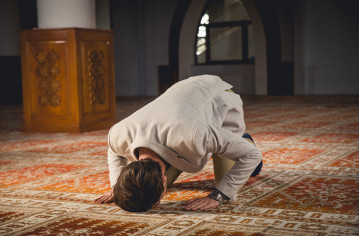
5 Pillars of Islam: 5 Daily Prayers
“It is I. I am Allah! There is no god worthy of worship except Me. So worship Me alone, and establish prayer for My remembrance.”
Quran, Surah Taha, chapter 20, verse 14.1
Throughout human history, we have come across various civilizations and communities that lived on this earth. Those who have travelled beyond our shores would have seen the remnants of the people who lived during those glorious years reflected in various books of history. Which often left us fascinated and wondering what life was like back then? How did they find peace with themselves and others around them, and what could have brought the end of their colorful story? One question that I would ask myself – whenever I was lucky enough to visit the awe-inspiring monuments – is how did they find God and connect with Him? I believe that it is only human to have the desire to connect to God.
Muslims believe that when the souls were first created by Allah, they were asked: “Am I not your Lord?” The souls replied with a resounding: “Yes, You are! We testify.”2
A Muslim who obeys and submits himself to the Will and command of Allah understands their need for Allah. He is free from all needs, for Allah owns the character of The Sustainer, Al-Samad (الصمد) – He is the Sustainer who is relied upon not just by humans, but the entire creation in His cosmos. As such, our response to the question: “Why do you pray to God?” would most often be that it is because we need Him, and our prayers act as the direct line of communication with our Lord.
The act of prayer is not something new for Muslims. Our history shared a glimpse of how the descendants and followers of the teaching of Prophet Ibrahim Peace Be Upon Him (PBUH) used to perform two units of prayers in the morning and two units of prayers in the evening. Allah had mentioned in the Quran that Prophet Ismail (PBUH) used to urge his people to pray.3 This act was continued by our beloved Prophet Muhammad (PBUH) before the five daily prayers were prescribed to him during the Night of Journey and Ascension (Isra’ and Mi’raj), which took place about 18 months before his migration from Mecca to Yathrib. It is interesting and important to note that in the light of recent events, where the Prophet Muhammad (PBUH) lost his two most beloved and strongest supporters, i.e. his wife Khadijah and his uncle, Abu Talib, and faced rejection by the people of Taif, that Allah prescribed the five daily prayers to His beloved creation Prophet Muhammad (PBUH). It is as though He is showing us a way to communicate and speak to Him, especially when you are at your lowest and in need of His Divine guidance and presence. Muslims should then be comforted to know that while others may not wish to hear them talk about their problems and seek assistance, Allah is always near to them and ready to answer to the caller whenever they call out to Him.4
I believe that the five daily prayers were prescribed to us as means for the faithful to connect and speak to our Lord and bring comfort to the weary heart. A Muslim should then strive hard to ensure that his daily schedule revolves around his five daily prayers. Not only because these pillars of the religion will ensure that the heart of the believer remains close and faithful to his Lord, but also because those who perform the five daily prayers faithfully will have their sins wiped out by Allah, the Most Gracious, the Most Merciful to His servants.
The Prophet Muhammad (PBUH) said to his companions: “Do you think that if there was a river by the gate of one of you, and he bathed in it five times each day that there would remain any filth on him” They (the Companions) said: “No filth would stay on him”. He Prophet Muhammad (PBUH) said: “That is the parable of the five prayers, Allah wipes out the sins with them.”5
May Allah make us among those who understand the value of the five daily prayers. May Allah grant us the sweetness of being close to Him, and may He help us in our journey to be amongst those who listen to what is said and follow the best of it.
Did you enjoy reading this article on 5 Daily Prayers? Share the article!
Delve deeper into the 5 Pillars of Islam by reading this next article: 5 Pillars of Islam: Zakat – purification of wealth, a symbol of social justice.
References:
1) Quran, Surah Taha, chapter 20, verse 14. Translation by Dr Mustafa Khattab, the Clear Quran
2) This conversation was recorded in Surah Al-A’raf, chapter 7 verse 172 that reads “And remember when your Lord brought forth from the loins of the children of Adam their descendants and had them testify regarding themselves. Allah asked, “Am I not your Lord?” They replied, “Yes, You Are! We testify!” He cautioned, “Now you have no right to say on Judgment Day, ‘We were not aware of this.’ – Translation by Dr Mustafa Khattab, the Clear Quran
3) Quran, Surah Maryam, chapter 19 verse 55.
4) “When My servants ask you O Prophet about Me: I am truly near. I respond to one’s prayer when they call upon Me. So let them respond with obedience to Me, perhaps they will be guided to the Right Way.” Koran, Al-Baqarah, chapter 2 verse 186.
5) Hadith Narrated by Imam at-Tirmidhi – Chapters on Parables, Book 44, Hadith 3107
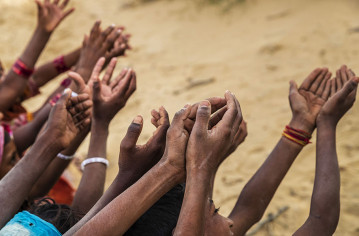
5 Pillars of Islam: Zakat – Purification of Wealth, A Symbol of Social Justice
Zakat / Obligatory donation is one of the five pillars of Islam and requires Muslims with enough wealth to set aside 2.5 percent of their earnings to people in need. In Arabic, the word ‘zakah’ brings several meanings, such as blessings, purification, and fertility. In essence, Zakat means growth or increments. As Muslims, we believe that Zakat is a determined portion of our wealth prescribed by Allah to be distributed to various beneficiaries. The various types of Zakat include:
1) Zakat on savings
2) Zakat on gold
3) Zakat on business
4) Zakat Fitrah
In this article, we will be focusing on how Zakat is being distributed to its recipients, and the wisdom behind why Zakat has been prescribed by Allah.
THE 8 CATGEORIES OF ZAKAT RECIPIENTS
From the verse above, the zakat recipients include:
1) The poor (fakir)
2) The needy (miskin)
3) The administrator of zakat (amil)
4) The new Muslim converts (Muallaf)
5) People who are in bondage (riqab)
6) Those indebted (gharimin)
7) One who strife in the cause of Allah (fisabilillah)
8) The wayfarer (ibnu sabil) or in today’s context known as the refugees.
ZAKAT – A SOCIO-RELIGIOUS TOOL IN ADDRESSING JUSTICE
HOW YOUR ZAKAT CONTRIBUTIONS ASSIST THE COMMUNITY
1. Social Development & Assistance for the Poor & Needy
In Singapore, the disbursement of Zakat contributions to the category of poor and the needy (Fakir and Miskin) is interpreted as the vulnerable subset of the poor. This refers to the lowest 5% of Muslim income earners in Singapore. The Islamic Religious Council of Singapore (MUIS) will consider the Per Capita Income (PCI) of its Zakat assistance applicants which currently stands at S$400. To ensure that Zakat assistance continues to meet the evolving needs of the community, the PCI amount is reviewed annually.
2. Religious Guidance, Islamic Education and Youth Engagement
For the zakat recipience of One who strife in the cause of Allah, Fisabilillah, MUIS investigates how Zakat can facilitate the realisation of a dynamic and robust part-time Islamic Education sector by increasing the quality of Islamic Education programmes in Singapore. This has led to the creation of aLIVE (Living Islamic Values Everyday) and ADIL (Adult Islamic Learning) programmes at various education levels. Learning materials, professional development of the Asatizah, and the Islamic Education Fund are amongst the key areas of development that benefited from the Zakat funding.
The Islamic Education Fund (IEF) is one of the initiatives introduced to support part-time religious classes (madrasah) in Singapore held in mosques through financial assistance which targets to fund families as well as teaching centres. To date, there are over 4000 students, 800 teachers and 38 aLIVE centres in operation to support the Islamic education programme. Through the IEF initiative, S$1.4 million has been distributed to support 4073 students in the aLIVE programme.
3. Religious Programmes and Mosque, Amil Management
Another aspect of Fisabilillah can be seen where Zakat enhances our local mosque sector through the funding of the Administration of Mosque and Leadership Programme (AMAL). AMAL develops capable and progressive mosque administrators. All key appointment holders of our mosques are trained in the AMAL programme in areas such as governance, manpower management and finance. Key officers from the six Enhanced Mosque Clusters (EMC) were enrolled in Zakat-funded Mosque Officers Development Scheme (MODS). Mosque leaders also need to undergo the Strategic Leadership Programme (SLP) which was designed to develop them into organisational and community leaders.
4. Madrasah & Asatizah Development and Assistance
Zakat funds also benefit our Madrasah and Asatizah through the funding of direct grants, resources and upgrading opportunities for Islamic educators. The development of leadership and teaching staff capabilities are also being looked into as the funding ensured the successful running of programmes such as ‘Leaders in Education – International’ (LEP-I), Customised Leaders in Education Programme (CLEP) and the Joint Madrasah System (JMS) curriculum.
For the zakat recipience of People who are in bondage Riqab, the Progress Fund Madrasah Assistance Scheme (PROMAS), was introduced as a form of an assistance scheme funded by Zakat to assist less privileged students. A grant for the Lembaga Biasiswa Kenangan Maulud (LBKM), or the Prophet Muhammad’s Birthday Memorial Scholarship Fund Board, was also initiated to help less fortunate students pursue higher education of their choice.
THE BEAUTY OF ZAKAT
(Bukhari and Muslim)
The Prophet’s Muhammad sayings/hadith puts forth the principle of caring for one another. When one shares what he or she loves from this world, whether in the form of wealth or other material benefits, it establishes compassion, empathy, and love towards others irrespective of their race, socio-economic condition, or financial background.
Zakat has a great potential to tackle poverty in Muslim society as well as other global financial crises. It is estimated that there are over 22.5 million refugees in the world. The staggering deficit in humanitarian funding calls for alternative monetary funding solutions. It is estimated that $200 billion to $1 trillion is generated in Zakat globally, and this indicates its potential in providing sustainable development in societies by addressing issues of poverty alleviation, reducing hunger levels in some countries, and building partnerships for community development. Zakat plays the role in spreading the beauty of Islam in the world to non-Muslims.
Ultimately, Zakat is a symbol of Islamic social justice as it aims to purify our wealth by the proper distribution of existing funds that helps to eradicate poverty and address other societal issues. As Muslims, let us fulfil our obligations as we enhance our spiritual connection with Allah through Zakat.
Did you enjoy reading this article on Zakat? Share the article! Read on for the next article in the series: 5 Pillars of Islam - Fasting in Ramadan
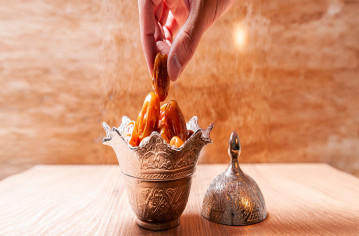
5 Pillars of Islam: Fasting in Ramadan
Fasting in the month of Ramadan, is one of the 5 pillars in Islam, alongside Testimony of Faith (Syahadah), the 5 obligatory prayers (Salah), obligatory donation (Zakat), and performing a pilgrimage to Mecca (Hajj).
Fasting has been ordained as mandatory by Allah to all adult, healthy Muslims. Children, the elderlies, pregnant women, breastfeeding mothers, travellers, and those who are physically and/or mentally incapable of fasting are exempted from this act of worship.
In its actual essence, fasting means to abstain from food and drink, as well as sexual intercourse, from sunrise to sunset every day, for a month. Ramadan is also a time for us to refrain from backbiting, lying and slandering – metaphorical diseases of the heart.
As Allah states in the Quran: “O you who believe, fasts have been enjoined upon you as they have been enjoined upon those before you, so that you may be God-fearing”1
And the Prophet Muhammad Peace Be Upon Him (PBUH) said:
“O people! A great month has come; a blessed month in which is a night better than a thousand months; a month in which Allah has made it compulsory upon you to fast by day, and voluntary to pray by night. Whoever draws nearer (to Allah) by performing any of the (optional) good deeds in (this month), shall receive the same reward as performing an obligatory deed at any other time; and whoever performs an obligatory deed in (this month), shall receive the reward of performing seventy obligations at any other time. It is the month of patience, and the reward of patience is Paradise. It is the month of charity and a month in which a believer’s sustenance is increased. Whoever gives food to a fasting person to break his fast, shall have his sins forgiven, and he will be saved from the Hell-Fire, and he shall have the same reward as the fasting person, without his reward being diminished at all.”2
The above verses both from the Quran and Prophet Muhammad sayings (hadith), show us that the practice of fasting serves several spiritual and social purposes, namely:
To attain piety (Taqwa)
To remind us of our weaknesses and full dependence on Allah for each and everything
To remind ourselves of the less fortunate, so we may feel more compassion towards them, thus encouraging us to render more help and assistance
To reinforce the extreme need to be more thankful for all the blessings He had bestowed upon us, as opposed to complaining
To reduce life distractions in the hopes that we can be more focused on our connection with Him
To maximise the generosity of Allah in His bountiful rewards
Muslims, from all over the world look forward to the holy month of Ramadan and its arrival is welcomed with joy and excitement amongst adults and children alike! Fasting encourages us to get closer to Allah and to exercise patience and compassion. Ramadan is when we focus on our spiritual well-being, by feeding and nourishing our souls through ibadah.
During the holy month of Ramadan, Muslims aim to strengthen our spiritual well-being by devoting ourselves to Allah, and also strengthen the relationships with our loved ones. Ramadan promotes solidarity among the community, where we perform acts of charity and give generously to those who are in need. It is also perfect for spiritual discipline - a time to practice mindfulness and to constantly reflect on how we can be better. During Ramadan is when we reflect on how deep our relationship with Allah is, and supplement it with intense studying and comprehending of the Quran.
Ramadan is also known as the month of the holy Quran. As Allah states in the Quran: “The month of Ramadan in which was revealed the Quran, a guidance for mankind, and clear proofs of the guidance, and the Criterion (of right and wrong). And whosoever of you is present, let him fast the month.3
May Allah grant us to be in the next Ramadan to come, allowing us to be able to reap all of its goodness, and most importantly, accept all our good deeds. O Oh Allah please hear my prayers. (Allahumma Ameen).
Did you enjoy this article on Fasting in Ramadan? Let us know your thoughts in the comments below! Read on for the final article in the series: 5 Pillars of Islam – Pilgrimage to Mecca.
References:
1) Quran, al-Baqarah, chapter 2 verse 183
2) Hadith, Ibn Khuzaimah
3) Quran, al-Baqarah, Chapter 2, verse 185
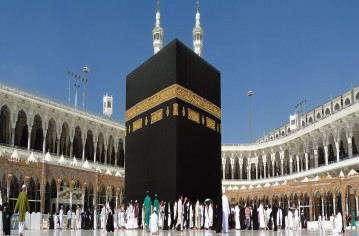
5 Pillars of Islam: Pilgrimage to Mecca
The obligatory pilgrimage to Mecca is also known as Hajj derives from the Arabic term. This pilgrimage to Mecca is obligatory for every physically and financially able adult Muslim to perform at least once in their life. It is the 5th pillar of Islam and takes place during the 8th to 12th day of the month of Dhul Hijjah, the final month of the Islamic lunar calendar.
فِيهِ آيَاتٌ بَيِّنَاتٌ مَّقَامُ إِبْرَاهِيمَ ۖ وَمَن دَخَلَهُ كَانَ آمِنًا ۗ وَلِلَّهِ عَلَى النَّاسِ حِجُّ الْبَيْتِ مَنِ اسْتَطَاعَ إِلَيْهِ سَبِيلًا ۚ وَمَن كَفَرَ فَإِنَّ اللَّهَ غَنِيٌّ عَنِ الْعَالَمِينَ ﴿٩٧﴾
“In it are clear signs [such as] the standing place of Abraham. And whoever enters it [i.e., the Ḥaram] shall be safe. And [due] to Allah from the people is a pilgrimage to the House - for whoever is able to find thereto a way. But whoever disbelieves [i.e., refuses] - then indeed, Allah is free from need of the worlds”1
What is the Significance of Hajj?
قَالَ رَسُولُ اللَّهِ صَلَّى اللَّهُ عَلَيْهِ وَسلم: منْ حَجَّ فَلَمْ يَرْفُثْ وَلَمْ يَفْسُقْ رَجَعَ كَيَوْمِ وَلَدَتْهُ أمه مُتَّفَقٌ عَلَيْهِ
Allah’s messenger, Prophet Muhammad (PBUH) says, “If anyone performs the pilgrimage for Allah’s sake without talking immodestly or acting wickedly, he will return [free from sin] as on the day his mother bore him."3
The pilgrimage to Mecca is, for many, a once-in-a-lifetime opportunity. It is an act of worship that requires a Muslim to have both physical strength and financial readiness. It also offers Muslims an opportunity to expiate all their past sins and start anew before Allah. through enduring the struggle of the journey and performing the obligatory pilgrimage rites.
In response to a divine revelation, Prophet Ibrahim (peace be upon him) brought his wife, Hajar and his first-born son, Prophet Ismail (PBUH) to Mecca - then a barren valley called Becca -, leaving them with basic supplies and entrusting them both to the care of Allah. Soon after, both mother and son were so overcome with thirst that Hajar feared Prophet Ismail (PBUH) was near death. Distraught, she climbed from one point of vantage Safa and trekked to another vantage point Marwa, and back, a total of seven times to see if she could seek help from passing desert travelers. From the act of tracking between the hill of Safa and Marwa is known as Sa’i. The Sa’i is one of the obligatory rites of hajj, thus commemorates the actions of Hajar and encourages the pilgrim to contemplate the state of one’s heart and actions in this temporary world.
From sundown on the second day of Hajj, the pilgrims together with all other Muslims around the globe celebrate the festival of sacrifice (Eid al-Adha) for the following 3 days. The celebration honours the devotion of Prophet Ibrahim (PBUH) in his willingness to sacrifice his son, Prophet Ismail (PBUH) when Allah commanded him so as a test of faith. The practice of slaughtering livestock such as goat, sheep, cow or camel known as udhiyah is also carried out by the pilgrims and Muslims who can afford to do so ensures that the poor and needy of the community are provided for during a time of celebration and festivities.
Did you enjoy reading this article on Zakat? Share it! Hope you’ve enjoyed our 5 Pillars of Islam series. Interested to learn more?
Take the next step in your journey to learning more about Islam and join our Beginners’ Course on Islam (BCI), where we will learn more about the fundamentals of Islam.
References:
1) Quran, Al-Imran, chapter 3 verse 97
2) Mount Arafah is a barren plain over 20 kilometers east of Mecca where Prophet Muhammad (PBUH) had given his final sermon.
.jpg)

